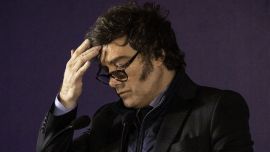They help take care of grief, resolve emergencies, listen to complaints, gather donations and organise assistance for those who need it most. In the low-income neighbourhoods of Buenos Aires, Argentina’s slum priests are veritable jacks-of-all-trades when it comes to solidarity and their role has grown along with the hardships in the midst of the pandemic.
"One of the keys to being a slum priest is to live where we work. We’re neighbours and that adds scope to our mission," says Father Lorenzo de Vedia, universally known as ‘Padre Toto.’
Since 2011 this football-loving Peronist has been in charge of the Virgen de Caacupé chapel and parish of Villa 21 shantytown on the south side of the capital, which together with Zavaleta houses some 80,000 people, of whom around 2,500 have contracted coronavirus.
"The quarantine and pandemic have brought out into the open realities which grow ever deeper, the structural injustice and the problems of infrastructure, but at the same time the solidarity is growing, something in the DNA of slum-dwellers,” he tells AFP.
Around 163,000 people live in shantytowns in the Federal Capital, slightly more than five percent of its population according to the 2010 census.
Neighbourhood mayor
There’s no rest for the priest. "The parish is kind of the town hall for the neighbourhood – I have to attend to a whole bunch of complexities, people who cannot pay their rent, who have run out of gas, whose houses have burned down or been flooded. Some never asked before but now they do," he says.
Every midday, since they have done since the community canteens were closed down, the neighbours line up in numbers in front of the chapel with their face-masks and respecting the social distance, awaiting their food.
Next door the kindergarten has been transformed into a centre of storage and delivery of food for a further 700 families. City Hall sends non-perishable food there. Padre Toto grows impatient, cutting all corners to add meat and vegetables to the diet.
"The state presence is insufficient and disorganised. We have to go reminding them that there is much to be done and often round it out," he assures.
At the start of the quarantine, which began on March 20 in Argentina, Padre Toto was one of the slum priests received by President Alberto Fernández.
"We felt we were being listened to," he affirms.
Some days are harder than others. Upon returning from accompanying a family to the cemetery, he finds waiting for him a young woman, to whom he delivers the ashes of her husband who died while she was hospitalised with Covid-19. She takes a telephone call and Father Toto pedals on his bicycle to Penna Hospital, where a neighbour has just died.
His way of protecting himself, he says, is a sense of humour and friendship.
"When people talks about shantytowns, you hear about the drugs, the violence, the poverty, the dead-end prospects but here human warmth and affection burst forth," he maintains.
‘We are not superheroes’
Further north in the capital lies Barrio Carlos Mugica, more commonly known as Villa 31, which has grown to some 45,000 inhabitants. Its Cristo Obrero parish is emblematic for slum priests, a group formed in 1969 at the height of the Third World priest movement.
Its work has been exalted by Pope Francis, who frequented them when Buenos Aires archbishop and recently sent them a message of encouragement.
"I want to be near you at this moment when I know you are fighting with [the help of] prayers and the doctors," the Pope told the slum priests.
Heading the parish, its chapels, the club, the community centre and the home for addict rehab is Father Guillermo Torres. At the age of 55, he has just shaken off Covid-19.
"We slum priests are not superheroes. We’ve built a network of solidarity along with the community," he tells AFP.
During the quarantine, Father Guillermo arranged a house-by-house survey which counted up 800 elderly people in the neighbourhood needing assistance.
At the Centro Barrial Carlos Mugica they store donations, together with jerry cans of bleach and water. A neighbour parks his delivery van where the priest and several assistants load up boxes of non-perishable food.
The van enters the shantytown between mud and paved alleys which grow ever narrower. Griselda, 25, a Paraguayan catechist, takes the boxes to each house. In another sector Paola and Gabriela, both the mothers of many children, distribute the food while attending to their own needs.
"When we were asking ourselves how to face up to the pandemic, the solidarity appeared," highlights Father Guillermo.
"The community containment is impressive, not just the Church, there are many soup kitchens and social organisations – that’s why the situation did not explode."
by Liliana Samuel, AFP

























Comments